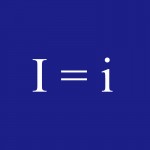 Imagine, in the early days of books, a small library consisting entirely of original manuscripts. Some of them are very old, and have been attacked by mice. Some have deteriorated so much that their pages crumble to dust when the custodian of the library tries to read them. He mourns the loss of these books, and contemplates the inevitable decay of the remaining books with sorrow. To be sure, new manuscripts are occasionally added to the library, but they cannot replace the volumes that are lost forever. This goes on until, one day, the young assistant librarian has an idea. “This book will be unreadable in five years,” he tells his elder. “But I can read it now. If I copy the words of this book onto sheets of new vellum, and bind them in a strong new binding, we will be able to read it for many decades to come.” The old librarian tenderly strokes the cracked spine of the crumbling volume, and shakes his head. “What good is a copy? It wouldn’t be the same book.”
Imagine, in the early days of books, a small library consisting entirely of original manuscripts. Some of them are very old, and have been attacked by mice. Some have deteriorated so much that their pages crumble to dust when the custodian of the library tries to read them. He mourns the loss of these books, and contemplates the inevitable decay of the remaining books with sorrow. To be sure, new manuscripts are occasionally added to the library, but they cannot replace the volumes that are lost forever. This goes on until, one day, the young assistant librarian has an idea. “This book will be unreadable in five years,” he tells his elder. “But I can read it now. If I copy the words of this book onto sheets of new vellum, and bind them in a strong new binding, we will be able to read it for many decades to come.” The old librarian tenderly strokes the cracked spine of the crumbling volume, and shakes his head. “What good is a copy? It wouldn’t be the same book.”
In the previous post, I summarized one of Derek Parfit’s main arguments that personal identity – being the same person over time – is not what matters in survival.
Human fission – one person ‘splitting’ into two – is clearly imaginable. It is physically possible, and is not far from being technically possible. Parfit argues compellingly that fission would preserve what is important in survival. Specifically, if Parfit knew that both of his cerebral hemispheres were about to be separately transplanted into two separate bodies, he would have the same rational justification for anticipating the experiences of both of the post-op survivors as each of us has for anticipating his or her own future experiences. This, despite the fact that the original Derek Parfit ceased to exist when he was divided. In this case, ceasing to exist is very unlike ordinary death. Ceasing to exist just consists in the fact that the two post-op survivors are different persons from one another, and neither one is the same person as the pre-op Derek Parfit. Loss of identity of this kind does not matter. Continue reading “Gappy Things That Branch and Change”
 What are we, if we are informational entities?
What are we, if we are informational entities?

 Imagine, in the early days of books, a small library consisting entirely of original manuscripts. Some of them are very old, and have been attacked by mice. Some have deteriorated so much that their pages crumble to dust when the custodian of the library tries to read them. He mourns the loss of these books, and contemplates the inevitable decay of the remaining books with sorrow. To be sure, new manuscripts are occasionally added to the library, but they cannot replace the volumes that are lost forever. This goes on until, one day, the young assistant librarian has an idea. “This book will be unreadable in five years,” he tells his elder. “But I can read it now. If I copy the words of this book onto sheets of new vellum, and bind them in a strong new binding, we will be able to read it for many decades to come.” The old librarian tenderly strokes the cracked spine of the crumbling volume, and shakes his head. “What good is a copy? It wouldn’t be the same book.”
Imagine, in the early days of books, a small library consisting entirely of original manuscripts. Some of them are very old, and have been attacked by mice. Some have deteriorated so much that their pages crumble to dust when the custodian of the library tries to read them. He mourns the loss of these books, and contemplates the inevitable decay of the remaining books with sorrow. To be sure, new manuscripts are occasionally added to the library, but they cannot replace the volumes that are lost forever. This goes on until, one day, the young assistant librarian has an idea. “This book will be unreadable in five years,” he tells his elder. “But I can read it now. If I copy the words of this book onto sheets of new vellum, and bind them in a strong new binding, we will be able to read it for many decades to come.” The old librarian tenderly strokes the cracked spine of the crumbling volume, and shakes his head. “What good is a copy? It wouldn’t be the same book.”